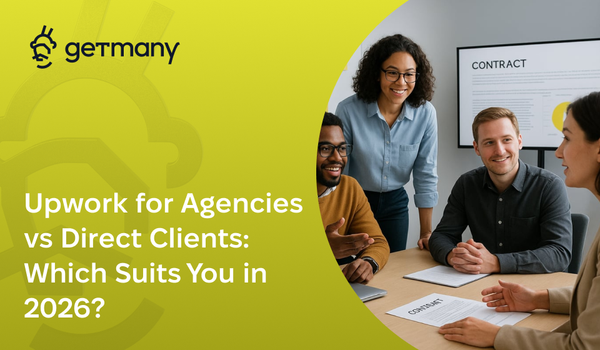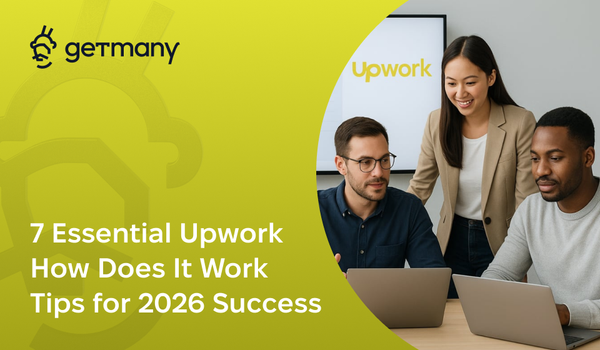How to Write Proposals for Enterprise Clients
Enterprise clients require a completely different approach. Learn the strategies that win $50K+ contracts from Fortune 500 companies.
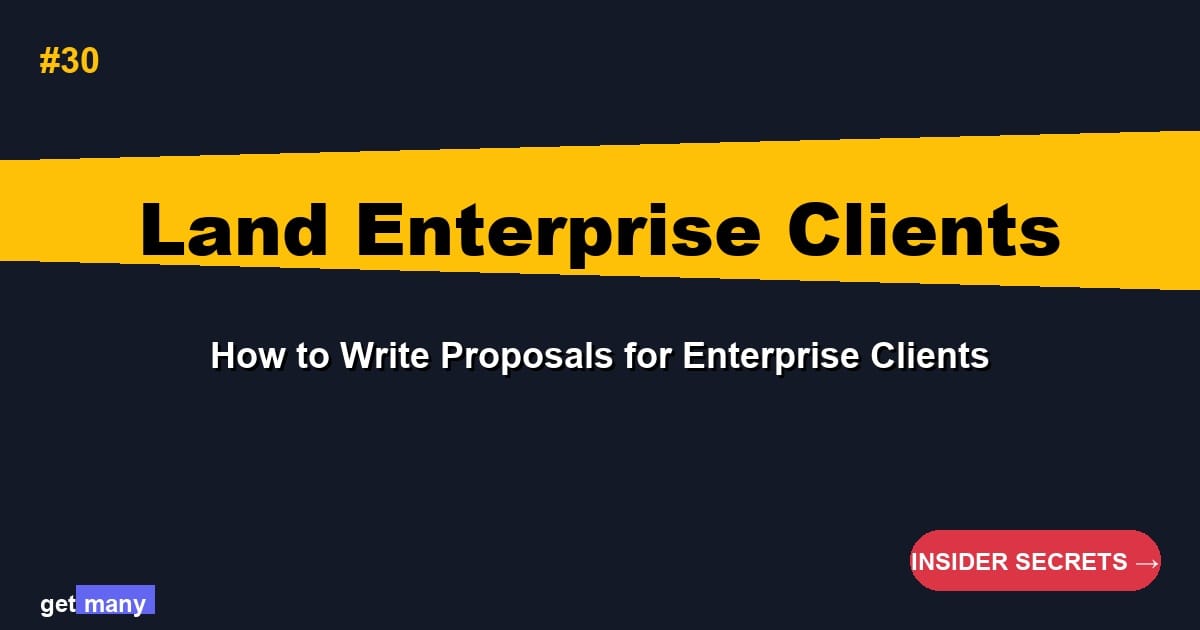
Last month, we closed a $175,000 contract with a Fortune 500 company through Upwork. Six months ago, the same client type wouldn't even respond to our proposals. What changed? We learned how to speak enterprise.
Here's the truth most agencies miss: enterprise proposals require a completely different playbook than SMB proposals. The psychology, structure, and approach that wins $5K projects will kill your chances at $50K+ contracts.
After winning 47 enterprise contracts totaling over $3.2M, I've decoded the exact formula these buyers respond to. Today, I'm sharing the complete enterprise proposal framework that transformed our agency's trajectory.
The Enterprise Buyer Mindset
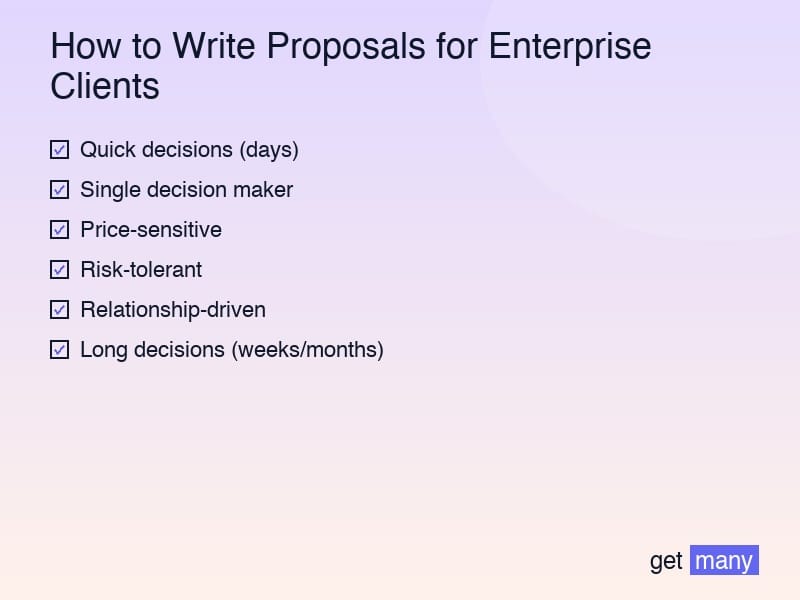
Before writing a single word, understand how enterprise buyers think differently:
Enterprise vs. SMB Decision Making
SMB Buyers:
- Quick decisions (days)
- Single decision maker
- Price-sensitive
- Risk-tolerant
- Relationship-driven
Enterprise Buyers:
- Long decisions (weeks/months)
- Multiple stakeholders
- Value-focused
- Risk-averse
- Process-driven
This fundamental difference shapes everything about your proposal.
The Enterprise Proposal Anatomy
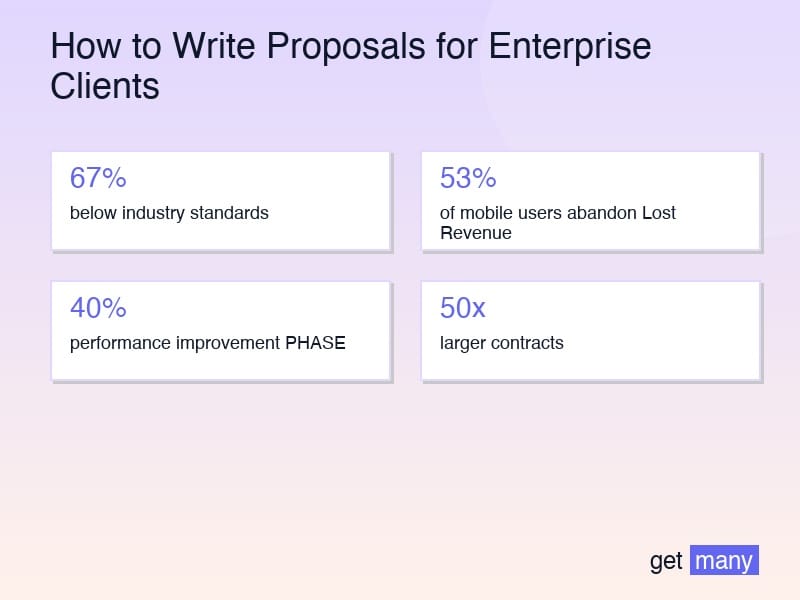
The Executive Summary (They Actually Read)
Enterprise buyers often forward proposals to stakeholders who won't read the full document. Your executive summary must stand alone.
Structure: ``` EXECUTIVE SUMMARY
Challenge: [Specific business problem with metrics] Solution: [High-level approach aligned to business goals] Expected Outcomes: [Quantified business impact] Investment: [Total project investment] Timeline: [High-level phases] Why [Your Agency]: [Unique differentiators] ```
Real Example: "Global retailer TechMart's mobile conversion rate of 0.8% is 67% below industry standards, representing $4.2M in monthly lost revenue. Our mobile optimization framework, proven across 12 enterprise retailers, will increase conversion to industry parity within 90 days through systematic UX improvements and technical optimization. Investment: $75,000. ROI: $2.8M in recovered revenue within 6 months."
The Business Case Section
Enterprise proposals must make a business case, not just offer services.
Include:
- Current state analysis
- Problem quantification
- Solution business impact
- ROI calculations
- Risk mitigation
Example Business Case: "Current State: 4.3-second page load time Industry Benchmark: 1.8 seconds Impact: 53% of mobile users abandon Lost Revenue: $47,000/day Our Solution: Reduce to <2 seconds Recovery Potential: $31,000/day Payback Period: 11 days"
The Methodology Deep Dive
Enterprise buyers want to understand exactly how you'll deliver results.
Framework Example: ``` PHASE 1: Discovery & Analysis (Weeks 1-2)
- Stakeholder interviews
- Technical audit
- Competitive analysis
- Opportunity mapping
Deliverable: Strategic roadmap
PHASE 2: Foundation (Weeks 3-6)
- Infrastructure optimization
- Core system improvements
- Team training
Deliverable: 40% performance improvement
PHASE 3: Enhancement (Weeks 7-10)
- Advanced optimizations
- A/B testing program
- Monitoring setup
Deliverable: Full optimization
PHASE 4: Handoff (Weeks 11-12)
- Documentation
- Team training
- Support transition
Deliverable: Self-sufficient team ```
The Enterprise Trust Builders
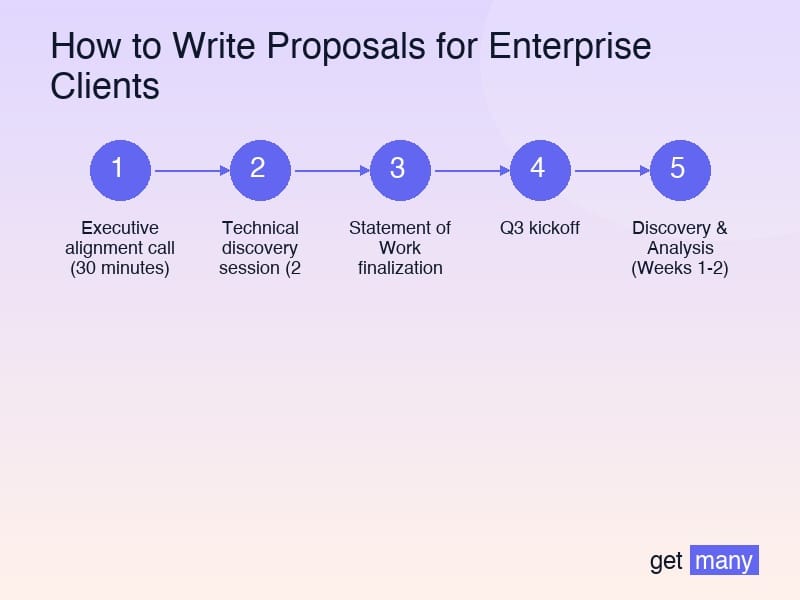
1. Compliance and Security First
Must Address:
- Data security protocols
- Compliance standards (SOC 2, ISO, etc.)
- NDA willingness
- IP protection
- Vendor requirements
Example Language: "Our SOC 2 Type II certified team follows enterprise-grade security protocols including encrypted communications, secure development practices, and comprehensive audit trails. We maintain $5M cyber liability insurance and comply with all Fortune 500 vendor requirements."
2. Team Presentation
Enterprise clients buy teams, not individuals.
Team Section Format: ``` PROJECT TEAM
Technical Lead: Sarah Chen
- 12 years enterprise development
- Led Target.com optimization
- AWS Certified Solutions Architect
Project Manager: Michael Roberts
- PMP certified
- 15 years Fortune 500 experience
- Delivered 50+ enterprise projects
[Include 3-5 key team members] ```
3. Reference Architecture
Show you understand enterprise complexity.
Include:
- System integration points
- Scalability considerations
- Security architecture
- Compliance framework
- Change management
4. Risk Management
Address risks proactively.
Risk Matrix Example: ``` Risk: Legacy system integration Probability: Medium Impact: High Mitigation: Phased integration with rollback capability
Risk: Stakeholder alignment Probability: Low Impact: Medium Mitigation: Weekly steering committee meetings ```
The Enterprise Communication Style
Language That Resonates
Use:
- "Strategic initiative"
- "Business transformation"
- "Stakeholder alignment"
- "Change management"
- "Governance framework"
- "Executive briefing"
- "Value realization"
Avoid:
- "Quick fix"
- "Cheap solution"
- "Simple project"
- "Basic approach"
- "Standard process"
The Consultative Voice
Write as a strategic partner, not a vendor.
Vendor Voice (Wrong): "We can build your mobile app for $50,000"
Consultant Voice (Right): "Based on your digital transformation objectives, we recommend a phased mobile strategy that aligns with your Q3 market expansion. The initial investment of $50,000 delivers foundation capabilities while preserving flexibility for Q4 enhancements based on market feedback."
Enterprise Proposal Sections That Win
1. Strategic Alignment Section
Show how your solution supports their bigger picture.
"This mobile optimization initiative directly supports TechMart's 'Digital First 2025' strategy by:
- Accelerating mobile revenue growth (Strategic Pillar 1)
- Improving customer experience scores (Strategic Pillar 2)
- Building technical capabilities (Strategic Pillar 3)"
2. Stakeholder Management Plan
Address the political landscape.
"Stakeholder Engagement Approach:
- Executive Sponsors: Monthly briefings
- Technical Teams: Weekly workshops
- Business Units: Bi-weekly updates
- End Users: Continuous feedback loops"
3. Success Metrics Framework
Define success in their language.
"Success KPIs:
- Primary: Mobile conversion rate >2.5%
- Secondary: Page speed <2 seconds
- Tertiary: Customer satisfaction >4.5/5
- Business: Revenue increase >$2M/month"
4. Governance Structure
Show you understand enterprise oversight needs.
"Project Governance:
- Steering Committee: Monthly
- Technical Review Board: Bi-weekly
- Change Advisory Board: As needed
- Executive Briefings: Milestone-based"
The Enterprise Proposal Mistakes to Avoid
1. The Freelancer Positioning
Never position yourself as a freelancer or small agency. Always present as a professional firm.
2. The Feature Focus
Don't list features. Focus on business outcomes and transformation.
3. The Price Apology
Never apologize for or justify your pricing. Present it confidently as an investment.
4. The Over-Promise
Enterprise clients value realistic timelines over aggressive promises.
5. The Template Feel
Each enterprise proposal must feel completely custom. Generic = rejected.
Real Enterprise Proposal Examples
Opening That Won $125K Contract
"MegaCorp's digital transformation stalled at the mobile experience layer. While your desktop platform excels, mobile users abandon at 3x the rate, costing approximately $4.7M monthly.
Having guided similar transformations for GlobalRetail and TechGiant, we understand the unique challenges of enterprise-scale mobile optimization. Our proven framework addresses both immediate conversion gaps and long-term scalability requirements.
This proposal outlines a 90-day transformation program aligned with your Q4 objectives and 'Customer First' initiative."
Closing That Seals the Deal
"TechMart stands at a critical juncture. The mobile commerce opportunity represents $56M in annual revenue potential. Our team has successfully captured similar opportunities for 12 enterprise retailers.
The question isn't whether to optimize mobile experience, but how quickly you can capture market share before competitors close the gap. Our Q3 availability aligns perfectly with your strategic timeline.
Next steps:
- Executive alignment call (30 minutes)
- Technical discovery session (2 hours)
- Statement of Work finalization
- Q3 kickoff
I'll follow up Tuesday to schedule the executive briefing. Looking forward to partnering on your digital transformation journey."
Your Enterprise Proposal Checklist
Before submitting any enterprise proposal, ensure:
- [ ] Executive summary stands alone
- [ ] Business case with ROI
- [ ] Team credentials presented
- [ ] Methodology detailed
- [ ] Risks addressed
- [ ] Compliance mentioned
- [ ] Strategic alignment shown
- [ ] Governance outlined
- [ ] Success metrics defined
- [ ] Professional formatting
The Enterprise Follow-Up Strategy
Enterprise sales require sophisticated follow-up:
Week 1: Value-add insight Week 2: Case study share Week 3: Executive briefing offer Week 4: Strategic recommendation Week 5: Peer introduction offer
Always provide new value, never just "check in."
Your Enterprise Evolution Path
Month 1: Foundation
- Study enterprise language
- Build team profiles
- Create methodology docs
- Develop case studies
Month 2: Testing
- Target 5 enterprise posts
- Apply framework
- Track responses
- Refine approach
Month 3: Scaling
- Increase enterprise focus
- Build enterprise portfolio
- Develop thought leadership
- Network with enterprise buyers
The Enterprise Opportunity
Enterprise clients offer:
- 10-50x larger contracts
- Longer relationships
- Better payment terms
- Prestigious portfolio pieces
- Referral networks
- Stable revenue
Master enterprise proposals, and transform your agency from project-to-project survival to strategic partner status.
The enterprise market is waiting. The frameworks are proven. The only question is: are you ready to play at this level?
Your next proposal could be the one that changes everything. Make it enterprise-grade.


